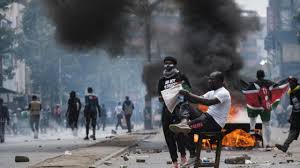
At least five people were killed in Rangpur, Chattogram, and Dhaka, with more than 400 injured nationwide in ongoing protests over quotas for government jobs, police and protesters said Tuesday. The violence followed clashes between rival student groups on Monday.
Police fired tear gas and rubber bullets as students demanding quota reforms clashed with counter-protesters backing the ruling Awami League party, who wielded sticks and hurled rocks.
The violence marks an escalation in a campaign that has ignored calls by Bangladesh's prime minister and top court for students to return to class. Students have been staging near-daily protests for weeks, demanding a merit-based scheme instead.
In Rangpur, Abu Saeed, a 25-year-old English department student at Begum Rokeya University, was killed during a clash with police on Tuesday. Police and Chhatra League activists clashed with students protesting for quota reform.
The police fired rubber bullets and tear gas, leaving many injured. Saeed was pronounced dead upon arrival at the hospital around 2:30 PM.
Rangpur Superintendent of Police Mohammad Shahjahan confirmed the fatality, and Dr. Mohammad Yunus Ali, Director of Rangpur Medical College Hospital, stated that several injured students were brought to the hospital, with one found dead.
In Chattogram, a student and a passerby and an unidentified person were killed in a clash between Chhatra League activists and quota reform protesters on Tuesday.
Wasim Akram, a 23-year-old student of Chittagong College, and Md Farooq, a 33-year-old pedestrian, were killed. Their bodies are in the morgue at Chittagong Medical College Hospital. Hospital Director Brigadier General Mohammad Taslim Uddin confirmed their deaths.
Among the injured, an unidentified youth, aged 24, succumbed to his injuries. Doctors said there were marks of bullet wounds on his chest and back.
In Dhaka, an unidentified 27-year-old was killed in a clash in the Dhaka College area. A passerby brought the young man to Dhaka Medical College Hospital around 5:30 PM on Tuesday, where he was declared dead. Inspector Bacchu Mia, in charge of the hospital police camp, confirmed the death.
As the violence escalates the authorities have deployed paramilitary Border Guard Bangladesh (BGB) in Dhaka, Chattogram, Bogura, and Rajshahi to maintain the law and order.
Protesters claimed they were holding peaceful marches at two public universities in Dhaka on Monday when they were attacked by ruling party student activists armed with sticks, rocks, machetes, and Molotov cocktails.
The attacks prompted students to take to the streets across the country on Tuesday.
Inspector Bacchu Mia reported that "297 people were treated at Dhaka Medical College Hospital," with 12 admitted.
Another 111 protesters at Jahangirnagar University received treatment at a campus clinic and nearby hospital.
Shamsur Rahman, head of the Jahangirnagar University medical center, stated that "more than 100 students were treated at our center." Dr. Yousuf Ali of Enam Medical College Hospital reported treating 11 patients, with four still admitted.
Students have been protesting for weeks, demanding the government scrap a quota system for government jobs and introduce a merit-based scheme. The current system reserves over half of well-paid civil service posts for specific groups, including children of heroes from the 1971 liberation war from Pakistan.
Last week, riot police attempted to disperse rallies with tear gas and rubber bullets, injuring at least 11 students in Cumilla. Monday's clashes were the worst violence since the campaign began, with activists at Jahangirnagar University reporting brutal attacks by members of the ruling Awami League's student wing.
Amnesty International condemned the violence, urging Bangladesh to "immediately guarantee the safety of all peaceful protesters." US State Department spokesman Matthew Miller also condemned "violence against peaceful protesters." Bangladesh's foreign ministry expressed disappointment at the State Department's statement, arguing that US claims of two deaths during the protests were unsubstantiated.
Protests resumed on Tuesday afternoon in several Dhaka locations, leading to fresh clashes between rival student groups. "Students were protesting at least a dozen places in the capital," said Dhaka Metropolitan Police spokesman Faruk Hossain.
Elsewhere, rallies joined by hundreds of students blocked rail lines and highways, including the Dhaka-Chattogram highway and railway, crucial to the country.
Source: Correspondents, AFP

